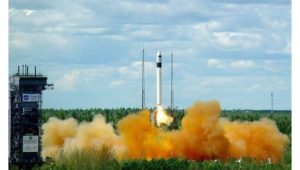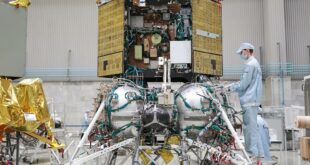
Russian launch provider Eurokot has suggested that its Rokot-2 light launcher could resume service in 2021 now that the launch vehicle uses Russian-made control systems. The last Rokot-2 launch occurred in April 2018 using the last launcher that used Ukrainian-made control systems.
SpaceWatch Russia & CIS reported in August 2018 that the Khrunichev State Research and Production Space Centre was developing a Russian control system for Rokot-2, replacing the Ukrainian control system used in previous Rokot versions. With the geopolitical situation between Russia and Ukraine at its worst in history, it had become untenable for both sides to use each other’s technologies and components in their respective strategic capabilities.
Should Rokot-2 light carrier rocket launches begin again in 2021 it could achieve an estimated annual income of over U.S.$120 million if the decision to resume the project is made by the end of this year, a source in the Russian aerospace industry told Russian news outlet Sputnik.
“The launches of Rokot-2 may begin in 2021 if the decision to resume the project is made in 2018. The positive money flow from the implementation of the project before 2025 is estimated at around 500 million rubles [approximately U.S.$7.6 million], while the annual income from the implementation of the project will increase from 2 billion rubles [approximately U.S.$30 million] in the year when the first launches are held to 8.8 billion rubles [approximately U.S.$134 million] by 2024-25,” the source told Sputnik.
The investment in the Rokot-2 project is estimated to be worth approximately U.S.$60 million, the source pointed out.
 SpaceWatch.Global An independent perspective on space
SpaceWatch.Global An independent perspective on space




